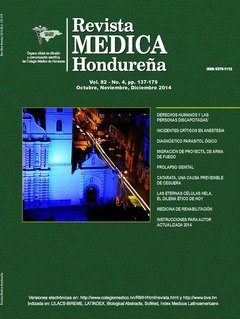Parasitological diagnosis at private and public clinical laboratories in Tegucigalpa, Honduras: response capacity?
Keywords:
Clinical laboratory techniques, Diagnosis, Honduras, Intestinal diseases, parasiticAbstract
Background. Timely and appropriate diagnosis of prevalent parasitic diseases in Honduras requires standardized methodologies and reliable results. Objective. To describe staff capacity in charge of parasitological diagnosis and methods used, clinical and public health laboratories, Tegucigalpa, 2009-2012. Methods. Cross-sectional descriptive study. Laboratories selected by convenience. A questionnaire was used to record information about the diagnostic capacity of responsible staff and diagnostic methods for malaria and intestinal parasites. Voluntary participation through verbal informed consent. Results. From a total of 35 laboratories, 57.1% (20) were in the public sector, 70.1% (47) employed laboratory technician as responsible staff; average work experience 13.1 years (range 1-35). For malaria diagnosis 17.1% (6 labs) reported using thin smear, 22.8% (8) rapid test for diagnosis of malaria, 31.4% (11) had criteria to differentiate among Plasmodium species. To identify intestinal protozoa 88.5% (31) reported using oil-immersion objective, 97.1% (34) performed geohelminths egg count; <12.0% used other methods, were not aware of their purpose and proper reporting. Reasons not to perform other methods according to diagnostic criteria included lack of trained personnel (57.1%) lack of supplies/reagents (54.2%), and low demand (42.8%). All expressed interest in continuous education. Discussion. Capacity to diagnose parasitic infections was inadequate in 85.7% (30) of laboratories. This does not correspond to training based on national health needs. Professional and technical training of laboratory personnel should systematically address both public health and clinical diagnosis of priority parasitic infections in Honduras.
Downloads
1149




